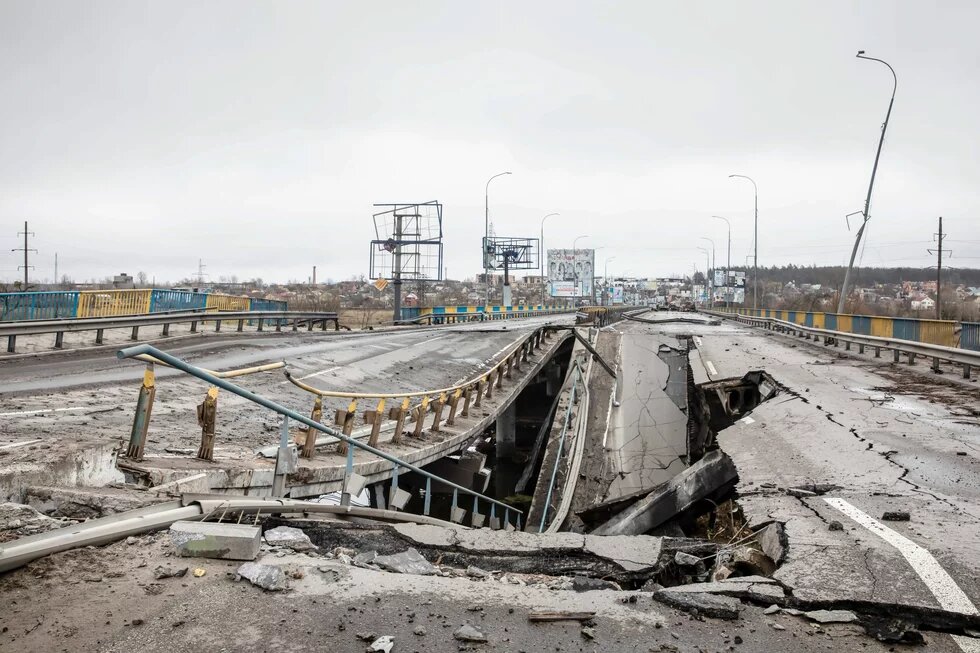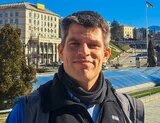Klaus Hoffmann, a senior public prosecutor in Freiburg, spent almost three years advising the Ukrainian Prosecutor General’s Office and assisting with the documentation of war crimes. In this interview, he discusses the difficulty of documenting sexual violence in armed conflicts, the current challenges facing international criminal jurisprudence and how digital technology is aiding criminal investigations.

The interview was conducted by Marion Kraske.
Mr Hoffmann, you work as a public prosecutor in Freiburg. For over two years you advised government agencies in Ukraine on war crime documentation. How did that come about?
Hoffmann: In February 2022 the then Ukrainian Prosecutor General contacted a US colleague of mine, who in turn contacted former colleagues he knew from the Yugoslavia tribunal in The Hague. And so that’s how I ended up hearing from him in early March 2022.
Who exactly did you advise?
The main goal was to advise the Ukrainian Prosecutor General’s Office in Kyiv and to assist with further training. We didn’t have our own investigative mandate. It’s important to make that distinction. In this capacity, we worked not only with colleagues from the Prosecutor General’s Office but also with provincial offices. For instance, I was in the eastern Ukrainian city of Dnipro a few times, where we worked with regional prosecutors.
What is most important when documenting war crimes?
It’s above all about being able to document the crimes relatively quickly. Of course, this is always a problem in armed conflicts. We know this from other conflicts, such as in Croatia and Bosnia, where investigators couldn’t access the crime scenes until very late. In Ukraine it’s different. Take the region around Kyiv, for instance: Russian troops were essentially only there for 4-5 weeks before they were pushed back.
Investigators quickly gained access to the crime scenes there. Because the Russian units had to flee in such a hurry, they left a lot of material behind. It’s astonishing what was found in the positions where they stayed. Diaries, military documents, ID cards – such material is very useful in investigations. In the east, the Russians cleaned up much more thoroughly; for instance, bodies were disposed of or burned, making documentation considerably more difficult. As an investigator, you are then reliant on refugees who can provide testimony or who managed to take material with them.
You also worked for the International Criminal Tribunal for the former Yugoslavia (ICTY) in The Hague, which was responsible for the Bosnian war from 1992-95, among other conflicts. What is different today compared to the Bosnian war, with its countless war crimes?
Some crimes were actually recorded live on video.
Today there are many more public sources of information available than during the Bosnian war. Through press reports, social media, radio communications, telephone connections, geodata, satellite imagery, and intelligence from military units, we can obtain vast amounts of data. For investigators, this always has two sides: On the one hand, it's good because you can prove crimes more effectively. On the other, you can no longer evaluate this volume of data without specialised software. A single investigator cannot handle this mountain of information alone. What makes Russia’s aggression in Ukraine so unique is that some crimes were actually recorded live on video – by cameras at supermarkets, gas stations or reconnaissance flights. For investigators, that is some pretty “good” material.
What does that mean in concrete terms?
The material allows us, as investigators, to sometimes identify specific individuals who, for instance, shot civilians on a highway. They get out of their cars, and you can actually see the killing take place in that situation. These recordings are so crystal clear that you can identify the perpetrators and the commanders. This works, for instance, by cross-referencing the footage with photos from social media, in some cases using automatic facial recognition.
Has the Russian war of aggression changed in terms of its approach? Is the impression that the Russian leadership no longer distinguishes between civilian and military targets misleading?
Civilian infrastructure has been massively attacked.
At the beginning, the Russian leadership genuinely believed they would take Kyiv within three days, replace the Ukrainian leadership, and wrap everything up quickly. When that didn’t happen, a new strategy was needed. Since 10 October 2022, civilian infrastructure has been massively attacked by all three branches of the Russian armed forces: its army, navy and air force. Since then, they have specifically targeted Ukrainian infrastructure to demoralise the population and force a surrender.
It is relatively clear that these are not permissible military targets; this fact can be used accordingly in later trials. The coordinated intensification of attacks by all armed forces from a specific day onward also points to an order coming from the very top.
What were the typical topics you advised Ukrainian investigators on?
We taught our colleagues to look very closely. Is a specific object civilian, or is it a so-called dual-use object – meaning, does the building also have military significance? An example would be an abandoned school building near the front where Ukrainian soldiers are staying overnight because they don’t want to sleep in an open field. If the building is attacked while it is serving to house the army, then it is a military target. A clear distinction must be made here. Furthermore, given limited resources, we advised our colleagues: You have more than 150,000 open investigations into war crimes. Concentrate your resources on those cases that are truly clear-cut.
In the spring of 2022, reports of massacres in Bucha emerged; dead civilians were found lying in the streets. How do you assess this footage? How well are the crimes documented?
Through a combination of mobile phone and video recordings, telephone data, and public sources, as well as witness testimony, we have a pretty good picture of what happened in Bucha. In January 2024, I was actually able to visit a victim’s family. The father had been riding his bike with his son to get food when they were stopped by two Russian soldiers. There was a brief exchange of words, and suddenly the father was shot on his bicycle. The son also fell to the ground and was shot at, but he played dead and was later able to flee. The perpetrators could be identified. Some of these cases are already in court, albeit with the perpetrators tried in absentia.
We repeatedly read about torture and targeted rape in the occupied territories. What facts are known about this?
We helped establish a dedicated department for sexual crimes. This requires specific expertise, including how to appropriately engage with victims. Ukrainian prosecutors are now well positioned in this regard. However, as of last year, there were only a few hundred registered cases. Many victims keep the crimes to themselves out of shame – this is very pronounced in Ukrainian society.
That’s why initiatives involving victims who are willing to speak out are so valuable. I met a young queer man who became a victim of sexualised violence. He vividly and publicly described the sexual torture and abuse he endured while leaving the occupied territories. His message was: “This is not my fault. I am a victim, these crimes are not isolated incidents, and I urge other victims to also make public what they experienced.” We cannot say exactly how many victims there are, but we have heard of rapes and other sexual crimes taking place in various occupied territories.
Rape, particularly of women and girls, is commonly used as a weapon during armed conflicts. In the Bosnian war, according to UN data, up to 50,000 women (mostly Muslims) were raped. The Hague judges classified the systematic rapes in the town of Foča as war crimes for the first time – a legal precedent. To what extent are these historic prosecutorial achievements helpful today in dealing with sexual crimes in Ukraine?
Russia is certainly tolerating and perhaps even encouraging the rape and sexual assault of the Ukrainian population. Further investigation will be needed to prove whether these crimes have been carried out systematically. Yet a pattern is discernible: We see this in the fact that wherever civilians are interned, the same things are reported time and again. Ukrainians released from Russia as part of prisoner exchanges have also described torture and sexual violence.
In fact, these crimes must be seen as part of Russian policy that seeks to achieve a change in the population's composition – not only through displacement and killings, but also through these sexual crimes. Just like in the Bosnian war, when Serbian perpetrators said, “You will no longer have Bosnian children, I will make you a Serbian baby,” the same thing is now happening in Ukraine with Ukrainian victims.
These crimes must be seen as part of Russian policy that seeks to achieve a change in the population's composition.
What makes documenting sexual crimes so challenging?
Investigative bodies face significant resource and time constraints, especially when it comes to international criminal prosecutions. Since sexual violence usually occurs in private spaces, the victim's testimony is often the only evidence available. Unless, of course, you actually have someone who was forced to watch the acts – which also happens in conflicts.
Gathering evidence is therefore significantly more difficult than it is for killings, like the case of the family in Bucha, where you can rely on a range of video recordings, mobile phone data, and so on. In that regard, the judgments from the Yugoslavia tribunal concerning rape and enslavement were very powerful. The fact that sexual crimes in this difficult context were categorised as war crimes was a milestone in international jurisprudence
Thousands of children have been deported from Ukraine to Russia; Terre des Hommes estimates around 20,000. What is known about their fate?
Our Ukrainian colleagues have managed to bring a few hundred children back to Ukraine. Teenagers, in particular, are providing critical information in their testimonies. The Russian side doesn’t actually deny the acts; they speak about them quite openly. However, they frame the context differently. They claim it is about bringing children to safety from the front lines and protecting them from the violence of war.
Yet reports indicate these children are placed in camps in Russia – sometimes taken as far as Siberia – or put up for adoption, often receiving new identities. Furthermore, there are no attempts to contact their parents or legal guardians. It is precisely because of these deportations that the International Criminal Court in The Hague has issued international arrest warrants for Putin and his children’s rights commissioner.
The UN recently accused Russia of deliberately terrorising the population in Ukraine’s occupied territories using drones. Is there evidence of genocide?
I would be very cautious about whether these acts prove genocidal intent. We must first collect data, and only then evaluate it. It is a complicated issue. For genocide, a protected group must be targeted specifically – and exclusively. The situation in Ukraine is that civilians are being attacked indiscriminately; it doesn’t matter whether Russian, foreign or Ukrainian citizens are hit. Therefore, we have to manage public expectations regarding potential genocide charges. Victims will expect verdicts that match that label, but failing to prove it risks devaluing verdicts for war crimes and crimes against humanity.
In Germany, despite the scale of the crimes, there are voices calling for Ukraine to cede occupied territories to finally make peace with Moscow. What is your assessment of these demands?
Let’s look at my home region of Baden. If it were under French control right now, daily life wouldn’t change much. But if we look at the eleven years of Russian occupation in Crimea, we see there is no freedom there. People are murdered, tortured and displaced if they do not completely submit to the new system. Since 2014, systematic re-education has been underway, specifically through the militarisation of youth. It is drilled into them that there is no Ukraine and no Ukrainian language. Children are introduced to weapons early, taken to target practice, and eventually end up in Russian army units fighting against Ukraine.
People are murdered, tortured and displaced if they do not completely submit to the new system.
We must therefore draw a clear distinction: A just peace is not simply the end of armed violence; it exists only when everyone can live freely and exercise basic rights. That is simply not guaranteed in territories conquered by Russia. In addition, the population of Crimea today is not the same as it was before the invasion in 2014. Facts like these are relevant when considering any potential referendum.
In Rwanda and Bosnia, the West hesitated too long and failed to prevent genocide. The Hague judgments against those responsible for the Srebrenica genocide, such as ex-General Ratko Mladić or the long-time Bosnian Serb leader Radovan Karadžić, proved the ethnic cleansing policy aimed at creating a “Greater Serbia”. There were also verdicts against leaders of the “Greater Croatia” para-state of Herceg-Bosna, including ex-General Praljak and others, who were responsible for blowing up the bridge in Mostar and setting up numerous concentration camp-like facilities in Herzegovina. In 1998, the UN International Criminal Tribunal for Rwanda handed down the first international genocide conviction against former village mayor Jean-Paul Akayesu. All these verdicts demonstrate the sheer inhumanity of these actors.
Why then does the West find it so difficult to apply these lessons to the war in Ukraine and counter these policies of annihilation?
To answer that, I am speaking less as an investigator and more as a politically-minded citizen, and I would pass that question on to our Chancellor and the federal government. It is obvious what is happening, and that Putin is not deterred by current efforts. The problem is that you have to get your own citizens – in this case, the German, British or French populations – on board. You must convince them that robust intervention is worth the cost.
Sanctions so far have been piecemeal and delayed – they haven't worked. If we had gone “all-in” early, energy prices in Germany would have risen, and we would have faced restrictions. I understand that poses a risk for politicians. Nevertheless, the strategy should have been communicated differently. The necessity should have been emphasised – for instance, that early intervention is cheaper than five years of war, the massive investments now required, and the cost of housing a million refugees.
Fear is running high. That appears to be why Chancellor Merz – contrary to his pre-election promises – is not following through on the announced Taurus delivery. Instead, funds for military support are actually being cut.
As an investigator, you are familiar with how conflicts progress. What dangers do you see currently?
We must explain to the public that Putin’s appetite won’t be satisfied by the attack on Ukraine. There is a real danger that he could attack the Baltic states in a year or two. He could use the large Russian minorities there as a pretext. Whether NATO would actually intervene in such a conflict is questionable – and Putin knows this. As Europeans, we must figure out how to counter this threat.
Of course, it is easier to pretend Russia is far away and the conflict won’t affect us. But given the threat level, we must position ourselves differently. We already have more than a million refugees, and – unlike in other countries – they are integrating into the workforce slowly. That money could be better spent elsewhere. Many want to go home, so the sooner we end this war, the sooner we can reduce these costs.
Furthermore, if we aren’t careful, we may face an even bigger wave of refugees. People in Ukraine are watching Europe’s positioning very closely. If they feel Europe is giving up on them, they will pack up their families and leave. That is the flip side of the coin often overlooked here.
How realistic is it that Putin will actually be prosecuted for the numerous crimes in Ukraine? Will we see a dedicated Russia tribunal – modelled on the Rwanda or Yugoslavia tribunals?
ann: We have the International Criminal Court (ICC) in The Hague; it has jurisdiction and has issued arrest warrants for Putin, his children’s commissioner and several generals. The evidence is strong. But unless Putin leaves Russia, there will be no trial.
An immediate regime change is unlikely, though it remains a possibility in the long term – perhaps in ten years. The Assad regime in Syria was surprisingly toppled recently, and in Serbia, we also saw regime change, albeit late, which led to Slobodan Milošević being transferred to The Hague.
We must document the crimes for the record, and we must give victims a voice.
Even if the actors differ, two aspects remain important: We must document the crimes for the record, and we must give victims a voice. We hope to eventually succeed – if not with Putin, then at least in bringing ministers or generals to justice. It is conceivable that some actors will eventually leave the country, opening the door for prosecution. Many of Putin’s inner circle don’t like living in Russia year-round; they have yachts and real estate in Europe. For example, the Croatian ex-General Gotovina was arrested while vacationing in Tenerife because he believed he was safe.
In Ukraine, some trials are already proceeding against perpetrators in absentia. However, this principle does not apply to cases before the International Criminal Court...
That’s correct. You cannot conduct cases in absentia there. Also, for formal reasons, the ICC lacks jurisdiction over the crime of aggression. Parallel to the ICC, however, a Special Tribunal for the Crime of Aggression against Ukraine is being established to address the invasion itself. Planning has been underway since 2022. This Special Tribunal could prosecute high-ranking officials, such as Vladimir Putin, Foreign Minister Lavrov, or other key representatives of the Kremlin and the Russian military.
This Special Tribunal could prosecute high-ranking officials, such as Vladimir Putin.
In Ukraine’s case, the ICC handles the “core crimes” (war crimes, crimes against humanity, genocide) because Ukraine submitted to the Rome Statute early on. However, for the crime of aggression, member states set higher hurdles, preventing the ICC prosecutor from investigating it. That will change with the Special Tribunal. This summer, the Council of Europe and Ukraine reached an agreement that included a significant compromise: while in absentia proceedings will likely be possible, sitting officials have been granted immunity. So, Putin cannot be indicted by this specific tribunal while he remains in office. The goal, however, is to make the war of aggression itself the subject of criminal prosecution.
Putin, together with Trump, has now drafted a so-called peace plan for Ukraine – which effectively amounts to a demand for capitulation. Critics call it a dictated peace, created without the involvement of Kyiv or the EU. Is this any way to restore justice?
No. You can neither achieve justice nor a lasting, genuine peace this way. This pact between the dictator Putin and the self-styled “dealmaker” Trump is absolutely absurd; no country would accept such an agreement for itself. Every single point comes from Putin’s pen and is an affront. Furthermore, the whole situation is strongly reminiscent of the 1990s, when Europe stood by and watched as Bosnia and Herzegovina was first attacked and then carved up. The structure created back then simply doesn’t work, and ultimately it rewarded Serbian aggression.
International arrest warrants currently exist for both Putin and Israel’s Prime Minister Benjamin Netanyahu for alleged war crimes. Chancellor Merz has essentially ruled out arresting Netanyahu. Is the international community applying a double standard?
Fundamentally, the existence of these investigations and warrants is encouraging. It proves that a double standard is not being applied by the court – that we aren’t just prosecuting small states in Asia and Africa. That is a strong signal.
That makes Chancellor Merz’s statement regarding Netanyahu – that Germany would find ways to circumvent the warrant – all the more regrettable. This undermines international criminal law. If Viktor Orbán in Hungary makes such a statement, it carries less weight than when Germany does. Germany played a decisive role in developing the Rome Statute. For such a country to announce, “We do not feel obligated”, despite the legal reality, is unacceptable. There was a considerable outcry from international legal experts.
Globally, one gets the impression that international law is no longer viewed by all actors – including the West – as a normative, non-negotiable authority. Particular interests are sometimes prioritised over the rule of law. What dangers does this pose for international criminal prosecution?
Either we stand by international criminal law, or we abandon it.
We are, in fact, at a crossroads. It is crucial that we bring these cases against the Russian and Israeli leadership to a successful conclusion in the coming years. That would send a strong message and advance international criminal justice.
But I also see a danger: If the law is not enforced, the project itself could fail, and the ICC would face a very bleak future. States might abandon this field entirely. This would unravel the fundamental global consensus established at Nuremberg and Tokyo – that the most serious international crimes must be prosecuted, regardless of the perpetrator’s official status. Until now, mostly African or Asian perpetrators were prosecuted – but today the stakes are higher. We must take a clear stance: either we stand by international criminal law, or we abandon it. However, we shouldn’t forget that international law has always been under fire. The Yugoslavia tribunal was also controversial. For instance, the Russian side attempted to extract Milošević and bring him to Russia.
Twenty years after the war crimes in Darfur, Sudan, the ICC recently found a former militia leader guilty on 31 counts of crimes against humanity, including murder, rape and torture. The defendant had turned himself in, and in this case, everyone seems to be in agreement. Yet with other state actors, as you explained, the situation is murkier. Is international criminal justice only effective where actors show little resistance, or where the lobbying machine is weaker?
You have to be realistic. There are UN members who do not act in accordance with the Charter. Compromises are inevitable. Nevertheless, I believe we have come a long way with the ICC and other tribunals. Certain legal standards have been set, and the discussion around war crimes and genocide is on a completely different level than it was just a few years ago.
And we shouldn’t forget the role of national justice systems in Europe, Latin America, the US and elsewhere. In Germany alone, there have been about 50 verdicts on war crimes and crimes against humanity so far. These are milestones – and they cannot simply be wiped away by statements from Mr Merz or other actors.



